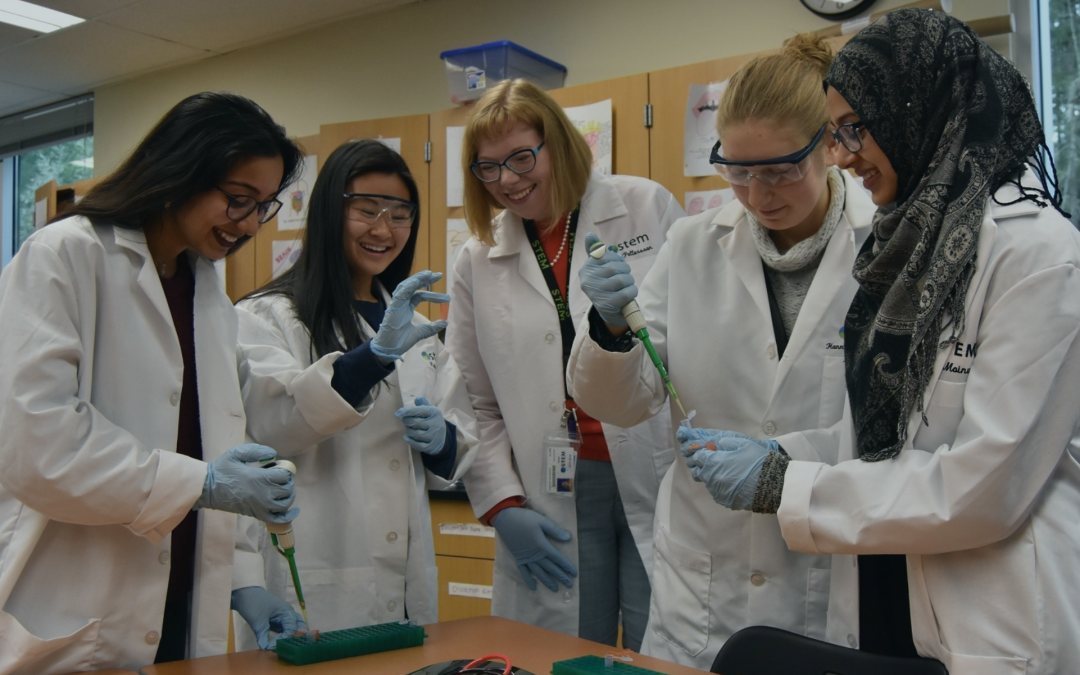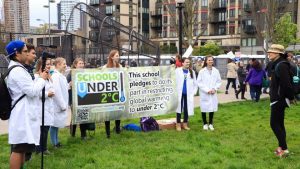By. Cynthia Burt, Associate Principal, Tesla STEM High School
Tesla STEM High School, located in Redmond, Washington within the Lake Washington School District, aims to inspire, educate, and innovate students, preparing them to enter higher education STEM programs and secure employment in STEM industries. We believe that our students can and will change the world. How do we know this? Because each day, Tesla STEM High School students tackle the National Academy of Engineering’s Grand Challenges for Engineering through our school’s rigorous curriculum.
Working with dedicated staff, Tesla STEM High School students study the Grand Challenges from day one. Academic framing in the first two years of a student’s experience integrates Science, Engineering, and Humanities, focusing on student development of multiple skills, including conducting authentic research, working with primary source documents, and developing scientific investigations. Students also learn to understand and apply the engineering design process while working collaboratively in a problem-based learning environment. The Grand Challenges are woven throughout the curriculum and ground the work. For example, every tenth-grader is taught the BioGeochemical crisis and how it effects five of the Grand Challenges, with particular emphasis on clean water, the nitrogen cycle, and carbon sequestration. Arny Leslie, our Engineering teacher, speaks for all classes when he states, “the Grand Challenges for Engineering are embedded in our student’s education. It really gives them context for all they do.”
During their junior and senior years at Tesla STEM High School, students work in a STEM Lab Concentration and/or STEM internship, conducting inquiry and research, exploring questions of their own, and championing their ideas to the level of publication and/or production. Juniors look to the Grand Challenges as inspiration for the Imagine Tomorrow Environmental Science Competition, an annual competition that challenges students to develop innovative technologies, designs, or plans to support the transition to a sustainable future. In 2018, Tesla STEM High School students won recognition across multiple competition categories in each of the three challenges: the Itron Food, Energy, and Water Challenge; the Boeing Aerospace and Transportation Challenge; and the McKinstry Built Environment Challenge. Throughout the year, students also work on issues such as redesigning transportation plans, creating green building plans, and looking at sustainable food sources for an urban community. All work takes place in Tesla STEM High School’s Environmental Engineering and Sustainable Design Lab.
Internships provide opportunities for students to work with STEM industries in our community. One such successful collaboration is found in the Waste Management internship, where students spend ten weeks gaining a holistic view of the waste industry and devising innovative ways to implement waste reduction at our school. For example, to address the Grand Challenge of managing the nitrogen cycle, students explored donating edible, unused food from lunch services, switching to durable service ware, and educating the community. Students have also influenced the community through implementing #recycleoftenrecycleright, where students developed a curriculum with Waste Management around recycling education and behavior change. Through this work with Tesla STEM High School, the Washington State Recycling Association awarded Waste Management “Recycler of the Year for Youth Education.”
As juniors, many students take the Environment and Engineering Sustainable Design class. Here, students work in groups to tackle contemporary world problems and look for ways to influence infrastructure and the environment. Many students end up taking their projects to state and national competitions. Examples of past projects include recycling waste heat for biohydrogen generators, field application of solar water disinfection, and halting natural gas disasters with the development of an automated safety valve through fluid dynamic analysis. The culture of this class benefits and strengthens all students, giving them an opportunity to develop a life-long desire for learning and empowerment to make change. Many of the students leave this class with an impassioned dedication to environmental science and tackling the engineering issues of our time.
Another place where we see the Grand Challenges impacting students is through student organization around climate change. Tesla STEM High School has pledged to meet the standards stated in the Paris Climate Accord by reducing our school’s greenhouse gas emissions. Recently, over 100 students gathered to form Schools Under 2C. This group implements the Paris Accord throughout our school and aims to educate youth around the nation of the importance of combating climate change. This is being modeled and accomplished at Tesla STEM High School by implementing a rigorous compost program which reduces our greenhouse gas emissions. Staff have signed pledges to turn off lights when they leave the room, and McKinstry energy usage data helps Schools Under 2C monitor and calculate carbon emission reductions. Schools Under 2C students also campaign and monitor recycling, heating, and transportation.
Tesla STEM High School provides incredible opportunities for students to immerse themselves in real-world learning that sparks their curiosity and creativity. Since our founding seven years ago, we have taken pride in attracting students who think differently and enjoy finding new experiential ways to learn, no matter their background, to create a place where all students are encouraged to envision a sustainable future. This is best summed up by retired teacher Mike Town, who was instrumental in the creation and vision of our school: “What we invent here isn’t just good STEM education, we invent a culture.” We continue to work hard to ground that culture in STEM literacy and equity and face the challenges of the future.
Author Bio
Cynthia Burt was a founding team member at Tesla STEM High School. She created the English curriculum and taught ninth- through twelfth-grade English at Tesla for the past six years. Cynthia currently serves as the associate principal at Tesla STEM and works with other instructors across the country to broaden experiential learning through NExT at Northeastern University. She has represented Tesla at the National Academy of Sciences for the Grand Challenges for Engineering. Discovering a passion for STEM literacy and problem-based learning, Cynthia has learned from her students that she too can be an advocate for change.


